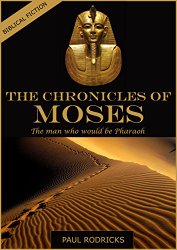The Chronicles of Moses
The Man who would be Pharaoh
Epic Novel
The Man who would be Pharaoh
Epic Novel
- The Man who would be Pharaoh
By Paul Rodricks
– The Man who would be Pharaoh
Now Available on Amazon.com
Historical-Ancient-Egyptian-Biblical Fiction Thriller.
$0.99 only LIMITED TIME OFFER ...
Until 31st October, 2015
Unique Novel with many DISCLOSURES.
Glossary of Ancient Egyptian Names
Senmut, Senenmut “Mother’s brother”
Kemet Egypt, ‘black’ land
Waset Thebes
Mennefer Memphis
On Heliopolis
Ta-Seti Cush, Kush
Ta netjer Punt
Read the preview of the CHAPTER THREE (Continued) here:
PART ONE
CHAPTER 3 (Continued...)
"The Queen is safe, but confined to her summer residence. No harm shall come to her."
Though relieved, Senenmut responded, ”I must see her and I cannot be a fugitive in my own country.. You go back and tell Tuthmosis that. I must return to the Palace and speak before the Royal Court officials. They alone can decide my fate. I must know what wrongdoing I am condemned for, to deserve such a grave sentence and suffer dishonor. Is there no justice in our great land of Kemet?
Has Tuthmosis forgotten that I have been his mentor and guardian all through his growing years? If today he commands the might of the Kemite army, he should be grateful to me for his military skills.”
"Once again, I beg your pardon, Chief Steward. My strict orders are to stop you, if necessary, by use of force. That means loss of life on both sides. We do not need this, my Lord. I empathize with the situation that you’re in.”
"If you do, Thanuny, go back and use your good offices to wake up the dead conscience of your new master. I must meet with the Queen and speak to the Court Officials. Till then, my soldiers remain battle-ready for any confrontation."
"My Lord, my orders are to tell you that your soldiers are free to return to Kemet after putting down their arms. The Pharaoh will enlist them in his army.
Djedefre heard this and looked at his Commander-in-Chief, "My Lord, I can assure you not a single soldier under my command will even entertain such a thought.” And turning towards Thanuny, "All of us owe our allegiance to our Commander-in-Chief, Vizier Senenmut. Your new Pharaoh cannot command our respect over his. The honorable Vizier has seniority to the throne of Pharaoh."
Thanuny did not take well to the retort coming from his counterpart, "Be careful with your words, Commander. You’re a foreigner..."
Senenmut interrupted him, "Enough... I cannot tolerate this threat against entering my own city.
Thanuny, return and tell Tuthmosis that I shall remain here outside the city-gate until midday. After which, I shall lead my soldiers towards the gate. May our beloved Amun-Ra forgives Tuthmosis should any precious Kemite blood spill."
Before Thanuny could respond in protest, Senenmut dismissed him with a quick wave of his hand, same time ordering Djedefre, "Do the courtesy to escort our guest Thanuny half-way to his lines."
Thanuny wheeled his horse around speaking to Djedefre, 'There'll be no need for it. I know my way through."
Then, turning towards Senenmut, he warned, "Chief Vizier, nothing good would come by defying the Pharaoh Tuthmosis."
Senenmut chose to ignore Thanuny.
***
NEXT: CHAPTER FOUR (the LAST PART OF THE BOOK SAMPLE)
Get your copy here:
REVIEWERS can avail a FREE digital copy
Contact or email the Author.
Your comments and review will be appreciated. Thank you.
Paul Rodricks,
Contact: paulrodericks@gmail.com
